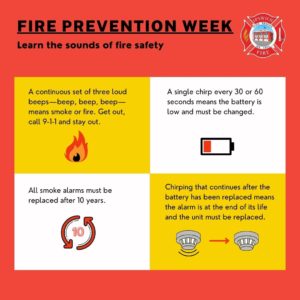
Fire Chief Paul J. Parisi and the Ipswich Fire Department urge all residents to “Learn the Sounds of Fire Safety” and to follow these basic tips to help protect their loved ones during Fire Prevention Week, which is being recognized this year from Oct. 3 to 9.
Fire Prevention Week is organized by the National Fire Protection Association, and has been recognized for over 90 years. Its goal is to educate the public about simple but important ways they can keep themselves and those they live with safe.
This year’s theme, “Learn the Sounds of Fire Safety,” focuses on the beeps, chirps and other noises coming from your smoke and carbon monoxide alarms, and how knowing what they mean could save your life.
“Knowing the sounds your alarms make means you will keep life-saving devices in the proper working order, and can take the quick action necessary in an emergency.” Chief Parisi said.
The Ipswich Fire Department urges everyone to recognize these common sounds to help you and your family better understand smoke and carbon monoxide alarms.
- A continuous set of three loud and long beeps means smoke or fire. Get out, call 9-1-1, and stay out.
- Four quick beeps means carbon monoxide has been detected. As CO is an invisible and odorless gas, a working alarm is the only way to detect its presence. Again, get out and call 9-1-1.
- A single chirp every 30 or 60 seconds means the battery is low and must be changed. Chirping that continues after the battery has been replaced means the alarm is at the end of its life and the unit must be replaced.
- All smoke alarms must be replaced after 10 years.
- Make sure your smoke and CO alarms meet the needs of all your family members, including those with sensory or physical disabilities.
To learn more about Fire Prevention Week, or to speak to your local Fire Prevention officers about steps you can take to protect your family, contact the Ipswich Fire Department at 978-356-6630.
To learn more about Fire Prevention Week, click here.